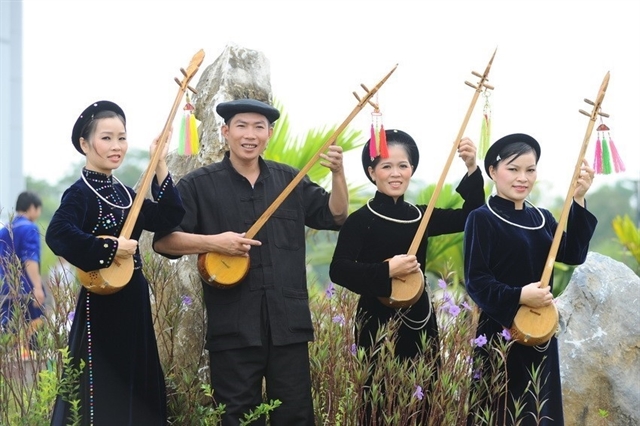
Then artisan Mã Văn Trực (second from left) from the northern province of Bắc Kạn performs Then singing. The art form has been recognised as an Intangible Cultural Heritage of Humanity by UNESCO. — VNA/VNS Photo Minh Đức
HÀ NỘI — The Then singing practice of Việt Nam’s Tày, Nùng and Thái ethnic groups has been named on the list of Intangible Cultural Heritages of Humanity, the Ministry of Culture, Sports and Tourism’s Department of Cultural Heritage said on December 13.
The recognition was made during the 14th session of the UNESCO’s Intergovernmental Committee for the Safeguarding of Intangible Cultural Heritage, held in Bogota, Colombia, on December 12 (local time).
Addressing the session, director of the Department of Cultural Heritage Lê Thị Thu Hiền pledged to take necessary measures to protect the values of Then singing.
According to the committee, the practice has met five criteria for being named on the list.
Then singing is an essential part of the spiritual life of the Tày, Nùng and Thái ethnic minority groups, and practised in many northern provinces, including Cao Bằng, Bắc Kạn, Thái Nguyên, Lạng Sơn, Hà Giang, Quảng Ninh, Sơn La, Lai Châu, Lào Cai, Bắc Giang and Yên Bái, and the Central Highlands province of Đắk Lắk.
Then performance reflects the cultural characteristics of those ethnic groups, from music to dancing and musical instruments.
The ethnic groups believe Then singing was handed down from a God belonging to a mysterious world to which only Ông Then and Bà Then can contact.
During rituals, Ông Then and Bà Then sing and play a musical instrument at the same time while presenting offerings to the god, thus contacting the deity on behalf of the community and asking him for things such as good health, bumper crops, happiness and a long life.
As a unique combination of music and song, Then singing is traditionally accompanied by a handmade gourd lute, called đàn tính or tính tẩu.
The art form, which combines a wide range of arts such as literature, music, painting and performance, has had an impact on local and national identities through its influence on literature, language, poetry, music, dance, rituals and spiritual practices.
Closely linked with the spiritual life of ethnic minority groups who often use ceremonial offerings to treat illnesses, Then singing is also seen as a therapy, together with medicine, helping to ease the worries of patients and their families.
Then singing was included in Việt Nam’s list of intangible heritages in 2012. — VNS